Dog Tragically Euthanized By Shelter Hours After Its Rescue, Shattering Owners’ Hopes For Happy Reunion
The story of Leona, a beloved 19-year-old French Poodle Maltese, has left the internet reeling with sadness and outrage.
A simple morning stroll turned into a nightmare for one Queens family when their beloved dog wandered off and found herself in the ‘care’ of a Brooklyn animal shelter.
The saga began when little Leona innocently slipped out of her Briarwood home—as her owner emphasized, this wasn’t out of character for the beloved poodle. She always found her way back, but sadly, that wasn’t the case this time.
Leona was found by a good Samaritan and brought to the Animal Care Center of NYC. The family was over the moon after receiving news that their dog was safe and sound. Little did they know Leona's fate was sealed within hours of her arrival.
The shelter soon made the incomprehensible decision to euthanize her. The reason? She was too old and allegedly suffering.
The family was still excitedly anticipating a happy reunion when they received the tragic news. Their hopes were dashed in an instant, replaced by an overwhelming sense of grief and injustice. The discrepancy between the shelter's actions and their own understanding of Leona's condition left them reeling.
While the shelter cited progressive neurologic symptoms as justification, the family saw only signs of old age—a natural part of Leona's journey, or any living thing’s journey, really.
The news spread like wildfire, prompting an outpouring of grief and anger on social media platforms like Reddit, where users expressed their shock and disbelief at the callousness of the shelter's actions.
This left us with a burning question: did getting old now warrant the death penalty? Well, we’ll leave that to the shelter to decide.
Let’s dig into the details
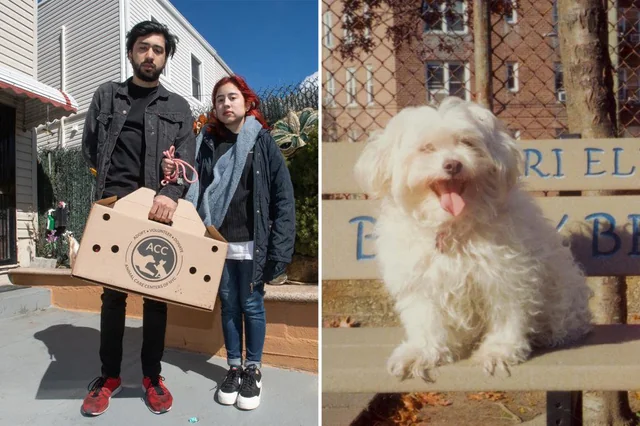
Apparently, she was missing for 3 hours when they put her down
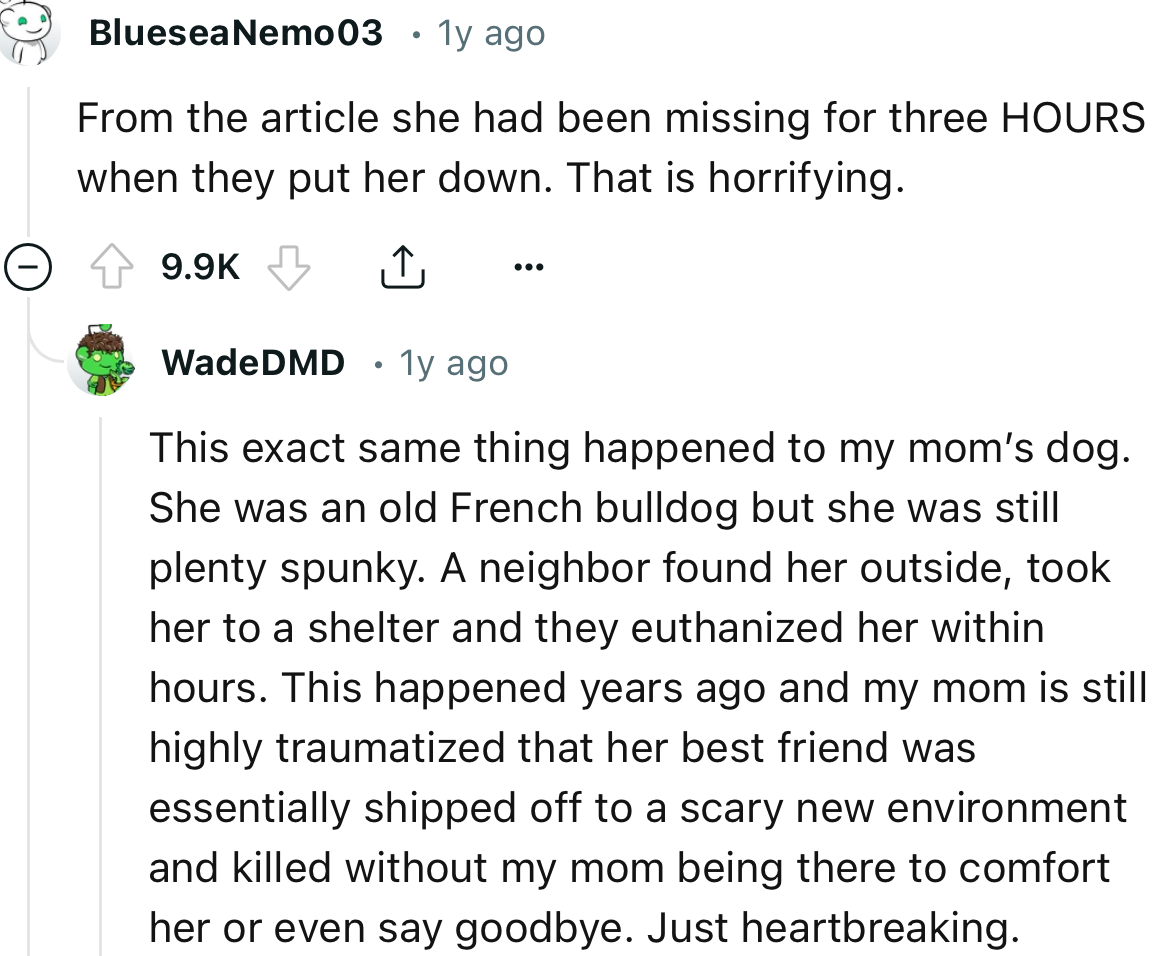
The Emotional Impact of Loss
The heartbreaking story of the dog’s euthanization highlights the profound emotional connections humans form with their pets. According to Dr. Alan Wolfelt, a grief expert, losing a pet can be as painful as losing a family member, often resulting in complex grief reactions.
His research emphasizes that pets play significant roles in our lives, offering companionship, emotional support, and unconditional love, which can create deep emotional bonds.
“The shelter taking that decision on their own, without discussing it with the owners, is disgusting.”

“My heart goes out to this family. I'd be absolutely devastated and would never be the same.”

The Grieving Process
This heartbreaking scenario underscores the complexity of grief and loss, particularly in relation to pets. Dr. Rachel Adams, a psychologist specializing in grief at the University of Chicago, explains that the loss of a beloved animal can evoke profound sadness and a sense of emptiness. Research shows that pet owners often view their pets as family members, and their passing can trigger similar grief reactions to those experienced during the loss of a human loved one.
According to studies published in the Journal of Loss and Trauma, the grieving process for pets can be complicated by societal perceptions that may minimize these emotions, leading to feelings of isolation for the bereaved.
“I feel for that family; losing a pet is always tough. I can see the vet's point of view if it was clear the animal was suffering, though.”
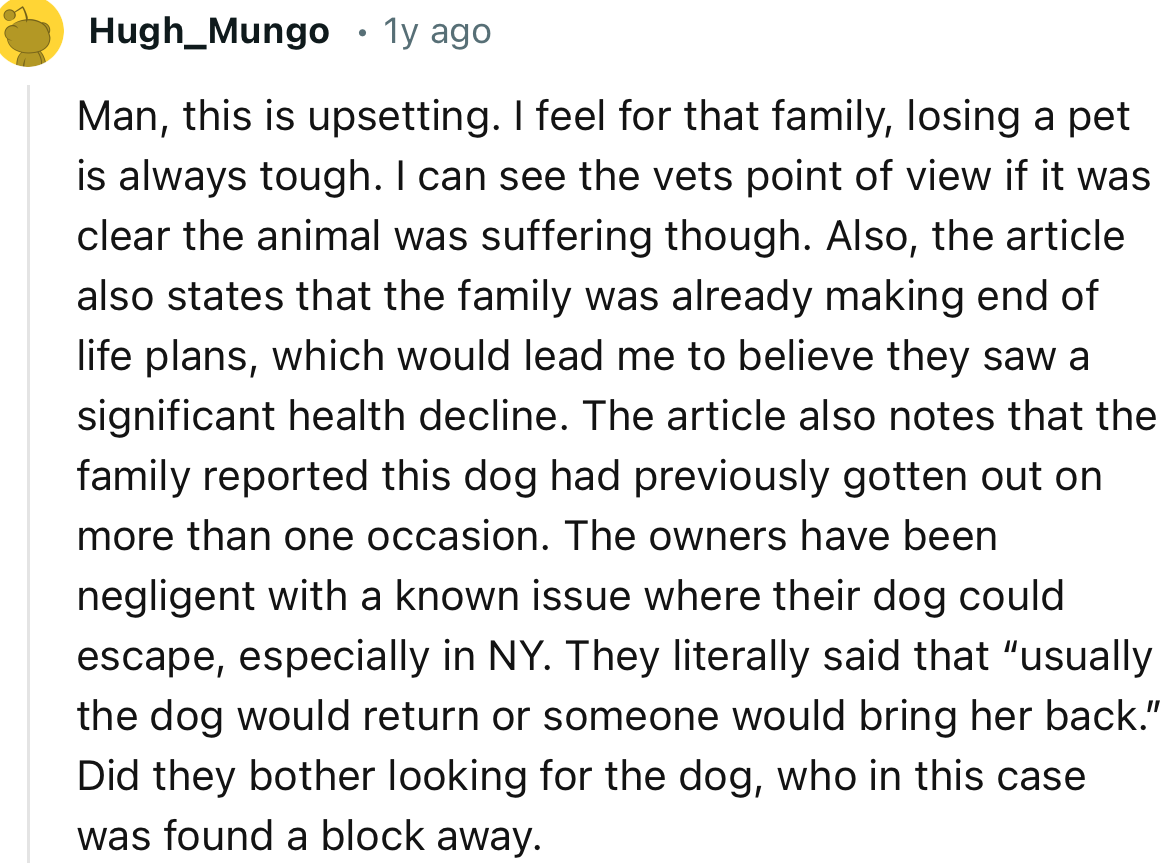
This throws more light on the situation
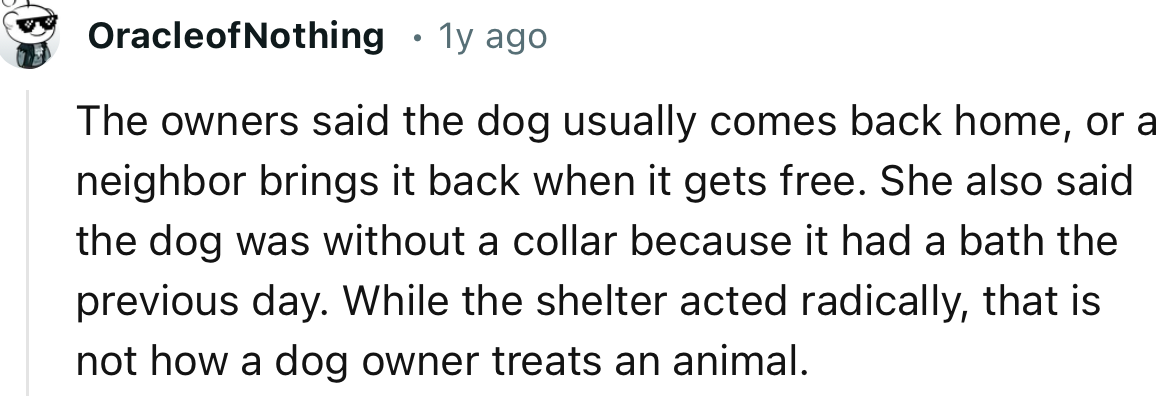
Studies in the field of pet loss and grief have shown that individuals may experience a range of emotions, including sadness, anger, and guilt. According to a study published in the Journal of Loss and Trauma, many pet owners report feelings of isolation during their grieving process, indicating a need for community support.
This underscores the importance of validating these feelings and recognizing that grief is a deeply personal and often misunderstood experience.
“I'm hoping the shelter would have protocols in place to reach out to owners before making a decision like this.”
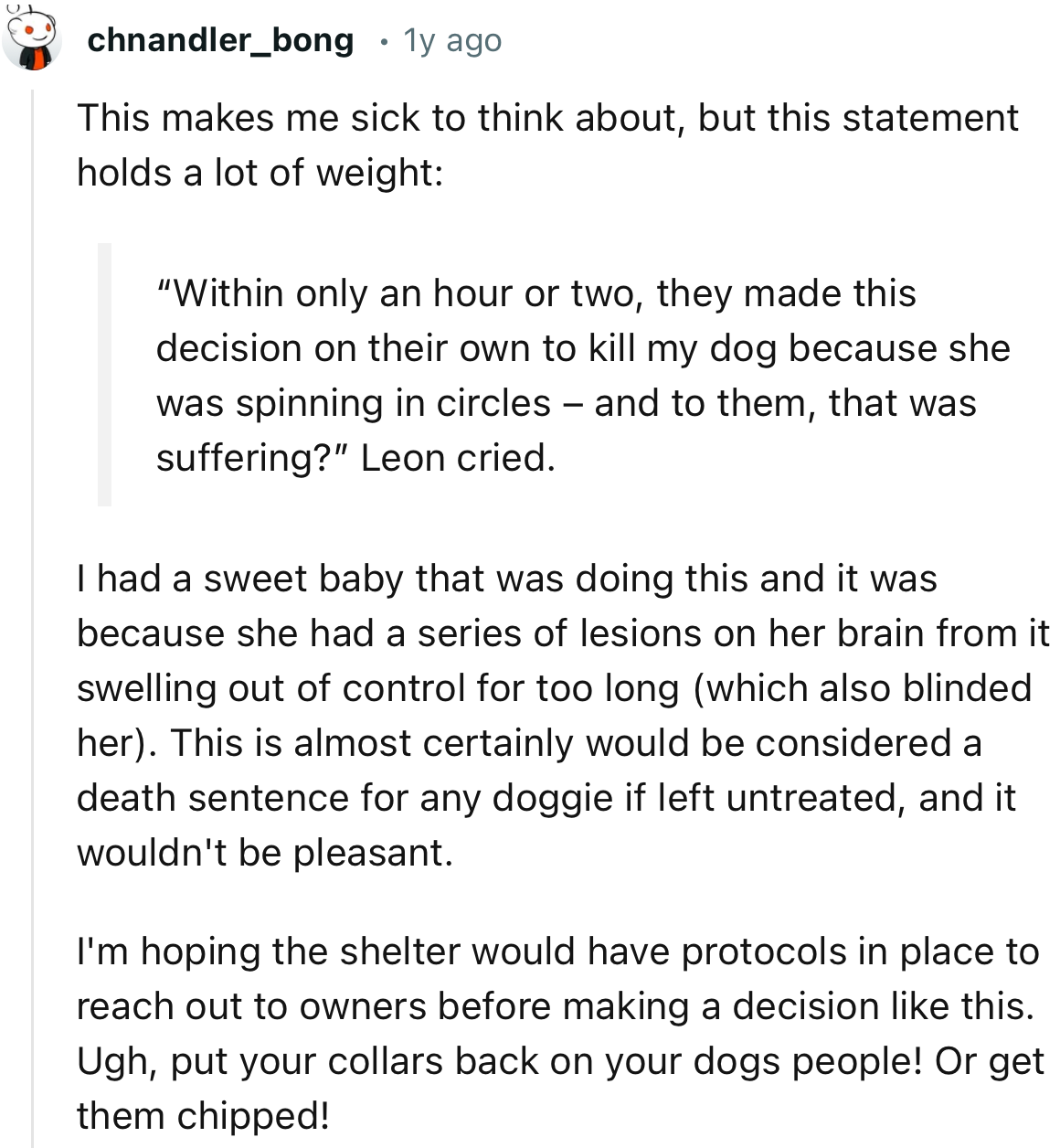
“It also sounds like the 19-year-old dog SHOULD have been put down earlier but was selfishly kept alive despite serious neurological problems.”
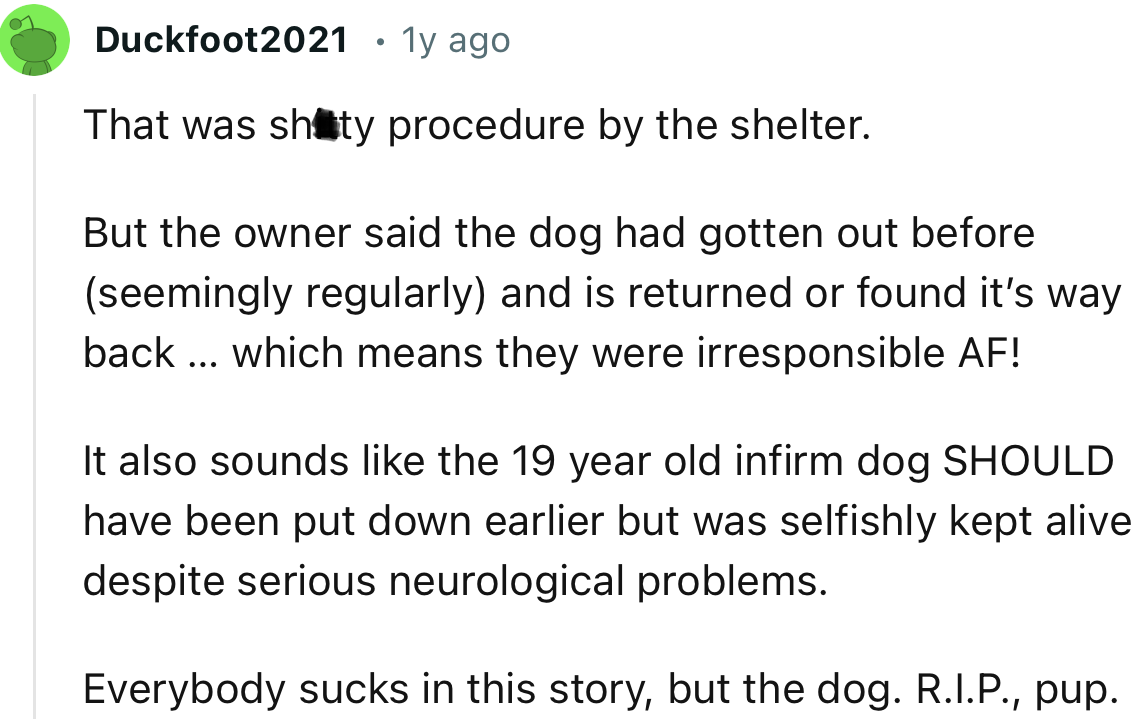
Moreover, the timing of this loss, occurring just after a rescue, adds to the emotional weight of the situation. The anticipation of a joyful reunion followed by unexpected tragedy can lead to heightened feelings of despair and confusion. Understanding that these feelings are legitimate is crucial for the grieving process.
Researchers emphasize that acknowledging grief and allowing oneself to feel the full range of emotions is essential for healing and moving forward.
“I feel for them, but the dog escaped at 9 a.m., and they didn’t even bother to look for it until 1 p.m.”

It’s crazy that the shelter called them over an hour after they had already put the dog down, saying they'd found her and she was safe.
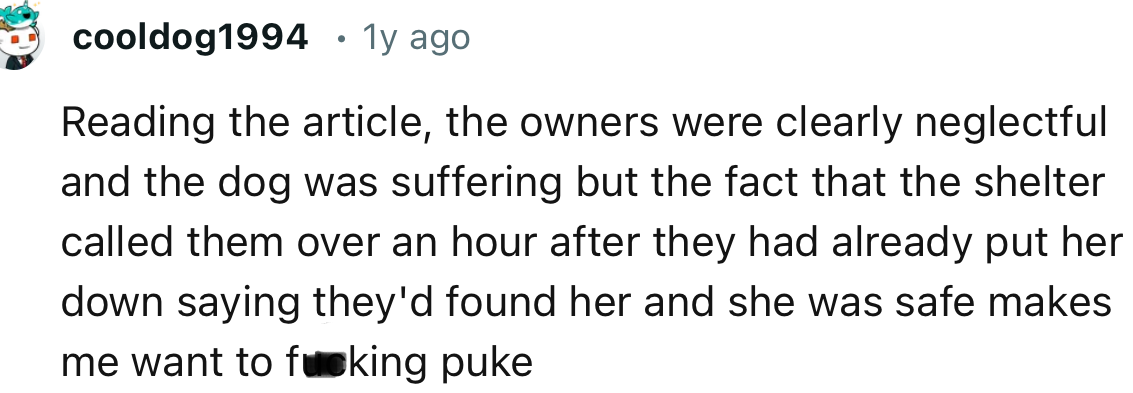
Navigating Grief and Loss
Therapists often recommend creating rituals to honor the lost pet, which can facilitate the grieving process. According to Dr. William Worden’s four tasks of mourning, acknowledging the loss and expressing emotions can help individuals navigate their grief more effectively.
Engaging in memorial activities, whether through creating a scrapbook or planting a tree in memory of the pet, can serve as powerful tools for processing emotions.
“I'm conflicted. On one hand, they had no business making that decision on their own. On the other hand, they found out the dog was sick and suffering.”
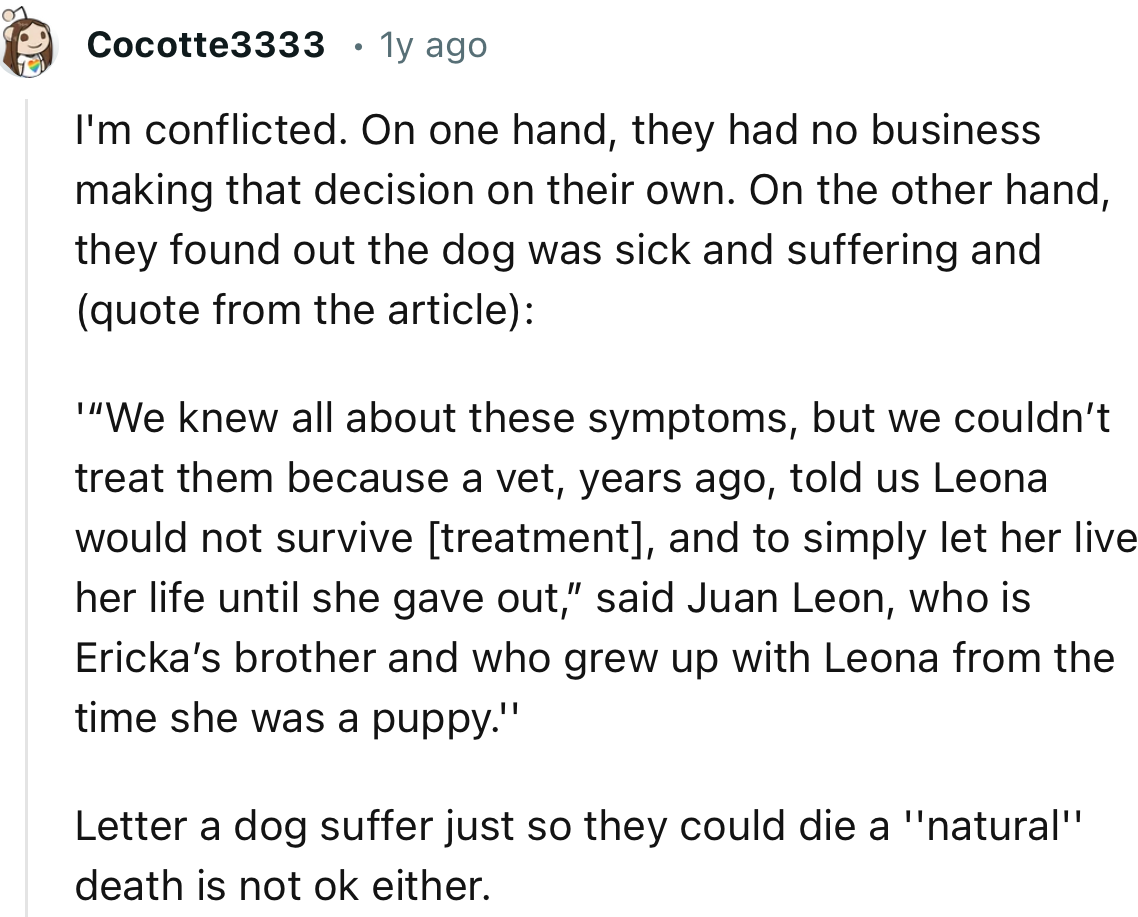
“These were not responsible pet owners, especially for owners of an old, sick dog.”
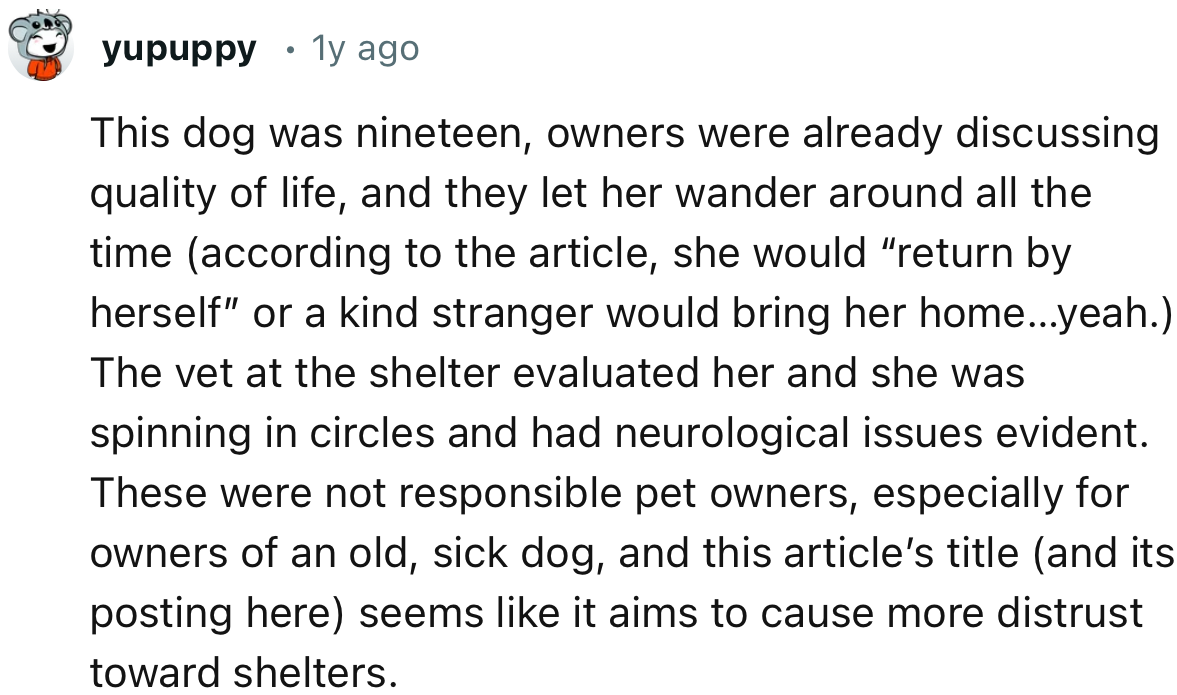
Coping with Grief
To cope with such profound grief, individuals can benefit from establishing supportive networks. Engaging with friends, family, or support groups can provide a space for sharing feelings and experiences. Dr. John Baker, a grief counselor at Emory University, emphasizes that talking about one's feelings can help process grief and validate emotional experiences.
Research indicates that individuals who engage in social support during their grieving process often experience better emotional outcomes, highlighting the importance of connection during difficult times.
Psychological Analysis
This situation highlights the depth of grief associated with losing a pet, emphasizing the need for support and understanding. From a psychological perspective, it’s important for individuals to engage in open discussions about their feelings of loss. Encouraging connections with others can significantly enhance the grieving process.
Analysis generated by AI
Analysis & Alternative Approaches
In conclusion, the grief experienced after the loss of a beloved pet is profound and deserving of recognition. By fostering supportive networks, creating meaningful rituals, and considering professional support, individuals can navigate their grief more effectively. Ultimately, these practices contribute to healing and emotional well-being.
Psychological Analysis
This tragic situation highlights the deep emotional bonds people form with their pets. The grief experienced is often profound and multifaceted, indicating a need for supportive dialogue and understanding during such difficult times.
Analysis generated by AI
Analysis & Alternative Approaches
In summary, the emotional impact of losing a pet is profound and often underappreciated. Research from the American Psychological Association emphasizes the importance of recognizing the significance of pet loss and providing support to those grieving.
By fostering open conversations and community connections, individuals can navigate their grief more effectively and find solace in shared experiences.
To support individuals grieving the loss of a pet, it can be helpful to encourage open conversations about feelings. Creating a safe space for individuals to share their memories and emotions can foster healing and validation, which are critical in the grieving process.
Moreover, connecting with support groups focused on pet loss can provide a sense of community and understanding, helping individuals feel less alone in their grief.
Additionally, it may be helpful to create rituals or memorials to honor the memory of the lost pet. These acts can provide closure and help individuals process their grief. Studies in clinical psychology suggest that creating tangible memorials can facilitate the grieving process, allowing individuals to express their emotions and maintain a connection with their lost pet.
Rituals can serve as a powerful tool for honoring the bond shared with the pet, contributing to emotional healing.
In this sad tale, a family was left devastated and questioning the very system they trusted to protect their furry friend. In a world where we rely on shelters to care for our beloved pets, Leona's story is a harsh wake-up call.
As we mourn the loss of Leona, let us also honor her memory by advocating for the rights and dignity of all creatures, great and small. After all, every life—no matter how small—deserves a chance to be cherished and loved.
What do you think about this story? Let us know in the comments.
Seeking Professional Support
In cases of intense grief, seeking professional support can be invaluable. Grief counseling can provide a safe space to explore emotions and develop coping strategies. Research from the American Psychological Association indicates that professional guidance can facilitate the grieving process, helping individuals navigate their feelings more effectively.
Encouraging those who are grieving to consider therapy can promote healing and resilience, ultimately leading to a healthier emotional state.
The Importance of Community Support
Community support can play a vital role in the healing process following the loss of a pet. Research shows that sharing experiences and connecting with others who have faced similar losses can significantly alleviate feelings of isolation and loneliness.
Participating in support groups or online forums dedicated to pet loss can provide validation and understanding, helping individuals navigate their grief journey more effectively.



